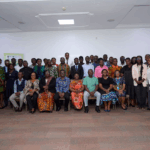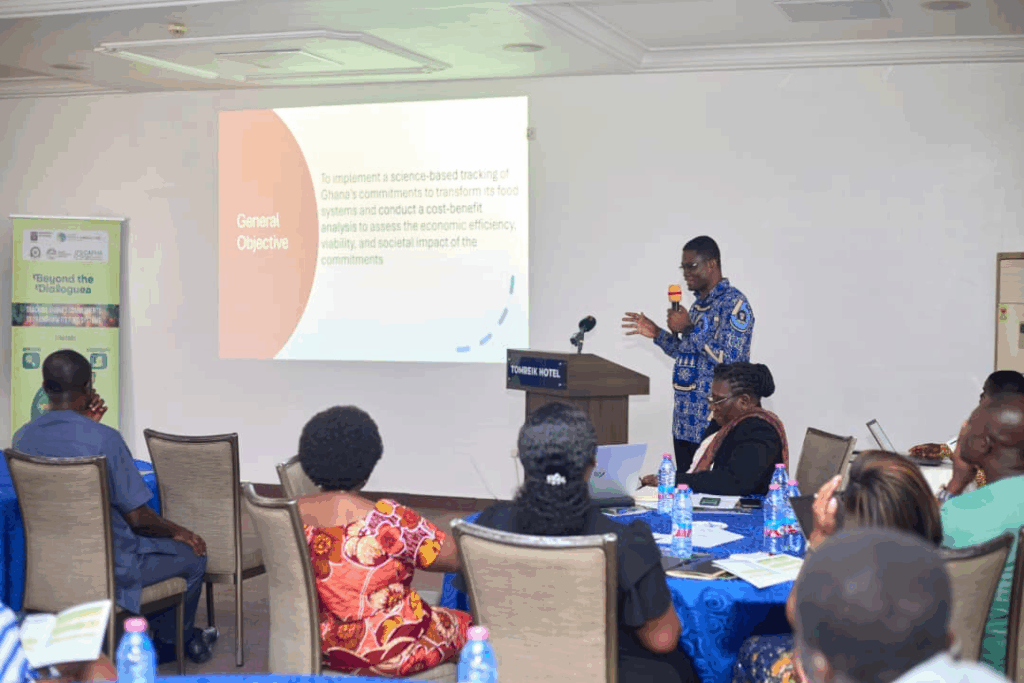
The College of Health Sciences at the University of Ghana’s ‘Beyond the Dialogues’ project organised a workshop aimed at monitoring and tracking Ghana’s progress on food system reforms.
The workshop, which took place on Wednesday, October 5, sought to raise awareness and build capacity among key stakeholders on Ghana’s commitments made under the United Nations Food Systems Summit (UNFSS).
It also focused on using science and data to measure how effectively these commitments are being implemented.
The initiative, known as the ‘Beyond the Dialogues Project’, brought together researchers, policymakers, and development experts for a sensitisation workshop themed: “Tracking and Cost-Benefit Analysis of Ghana’s Food Systems Transformation Commitments” at the Tomreik Hotel in Accra.
Speaking at the event, a public health nutritionist at the University of Ghana’s School of Public Health and lead of the Beyond the Dialogues Project, Professor Amos Laar, explained that Ghana made 17 major commitments in 2021 to transform its food systems.
“As part of those pledges, there were seventeen in total, including, for example, developing guidelines that provide Ghanaians with advice on the kinds of foods that are good to eat and those that should be limited.”

He explained that the project, which involves collaboration between the Ministry of Food and Agriculture, National Development Planning Commission, and Ghana Statistical Service, is using a science-based approach to track progress, identify challenges, and evaluate cost-benefit outcomes.
“We are tracking whether the commitments are being implemented, and if not, why,” he noted.
“We’re also using cost-benefit analysis to show the government the potential returns on investment, both monetary and non-monetary.”
Prof. Laar expressed confidence that Ghana’s food systems transformation agenda would continue regardless of political changes, describing it as a “national” rather than a “partisan” project.
“When the government committed to this in 2021, it did so on behalf of Ghana, not a political party,” he said.
“If we get our food systems wrong, it will affect everyone, not just one group or political side.”
He commended the government for its progress, highlighting that Ghana had already met some of its pledges, such as the development of food-based dietary guidelines and the drafting of four new food-related policies covering food advertising, labelling, procurement, and taxation.
“The government committed that by 2022–2023, Ghana would have food-based dietary guidelines and that commitment has been met,” he said.
“Four policies have also been drafted and are awaiting ministerial approval.”
However, he acknowledged that some targets remain difficult to achieve, citing complex issues around land, seed, and food security, and traditional land ownership systems that make implementation challenging.
Co-principal investigator of the project, Professor Anna Lartey, said the urgent need to protect Ghana’s food systems from environmental pollution, especially from illegal mining activities (galamsey) that are contaminating soil and water.
“Nutrition really starts from the soil,” Prof. Lartey said. “What is in the soil goes into the plants and ends up on our tables. If harmful chemicals enter the soil, they find their way into our food and that can cause serious health problems.”
She warned that exposure to heavy metals such as lead through food and water is becoming a major concern, and called for stronger regulation and education on food safety.
Prof. Lartey also highlighted the rising cost of healthy diets, revealing that about 65 per cent of Ghanaians cannot afford a nutritious diet.
“Many people end up buying cheap, energy-dense foods high in sugar and carbohydrates because healthy foods and vegetables are too expensive,” she explained.
“We must find ways to make healthy foods affordable and available all year round.”

She urged Ghanaians to educate themselves on food-based dietary guidelines developed by the Ghana Health Service, adding that good nutrition requires more than filling the stomach but eating the right foods in the right amounts.
Prof. Lartey highlighted major weaknesses in Ghana’s food systems, including over-reliance on staple crops and limited investment in fruits and vegetables.
“If you look at many countries’ food production systems, they are heavily focused on staple foods,” she said.
“It’s good to produce cassava and rice, but that’s not enough. We also need to pay attention to the production of fruits and vegetables.”
Turning her focus to urban consumption habits, Prof. Lartey warned that Ghana’s food environment is now flooded with highly processed foods and sugary beverages, which are gradually replacing home-cooked meals.
“Food outlets are everywhere. It’s almost like people have stopped cooking at home,” she remarked. “We are now depending on highly processed foods and sugar-sweetened beverages, and this is affecting the quality of our diets.”
As part of the discussions, collaborating institutions including the Ministry of Food and Agriculture (MoFA), the National Development Planning Commission (NDPC), the Ghana Statistical Service (GSS), and the Coalition of Actors for Public Health Advocacy (CAPHA), shared their perspectives on why Ghana’s food systems transformation remains vital to the country’s long-term health and development goals.
Speaking on why Ghana is interested in food systems transformation, a representative from the Ministry of Food and Agriculture said the country’s efforts are driven by the need to promote healthier living and sustainable production.
“Our quest towards ensuring a healthier life remains the priority,” the MoFA representative noted, adding that the ongoing work on food systems “has reinforced the essence of working across sectors to address the complex issues around the food value chain.”
They highlighted that the ministry’s participation in the Beyond the Dialogues Project has underscored the importance of evidence-based policymaking.
“Evidence is critical in giving credence to the claims we make,” the representative said. “We need to strengthen our data systems to deliver the evidence we so much need.”
The ministry reaffirmed its commitment to the government’s Feed Ghana Agenda, aimed at boosting food production and productivity.
“We remain steadfast in pursuing our mandate on increased production and productivity,” the official said. “We will continue to refine our pathways toward sustainability and better health outcomes.”
The National Development Planning Commission (NDPC) also, in their remarks, described the initiative as central to building an inclusive and sustainable economy.
“Food systems transformation is not only about agriculture or food production. It’s also about how we produce, distribute, and consume food in ways that sustain us, protect the environment, and promote equity and prosperity.”
The Commission explained that Ghana’s participation in the 2021 UN Food Systems Summit marked a turning point in national efforts to strengthen the food value chain and address challenges such as climate change, food insecurity, and inequality.
“When we strengthen our systems, we strengthen the very foundation of our national development,” they said. “These commitments must be continually mainstreamed into the country’s development agenda.”
The NDPC outlined a series of measures it has undertaken, including the National Food Systems Dialogues, sub-national consultations, and collaborations with the private sector, to ensure food and nutrition security are reflected in medium-term national plans.
“Integrating food systems transformation and nutrition security into national policy enables the country to address interconnected challenges more systemically,” they explained.
“It enhances coordination across sectors and ensures investments yield measurable and sustainable results.”
A representative from the Ghana Statistical Service (GSS) stressed that data remains the backbone of effective planning and monitoring.
“We all know that anything that cannot be measured cannot be managed,” the GSS official said. “Without data, it’s difficult to know whether progress is being made. That’s why we will continue to support data collection and tracking efforts to ensure this project’s success.”
The Coalition of Actors for Public Health Advocacy (CAPHA), speaking on the role of civil society organisations in food systems transformation, urged stronger accountability and collaboration to translate Ghana’s commitments into concrete results.
“The urgency of transforming Ghana’s food system cannot be overstated,” the CAPHA representative said. “Our current food systems are failing to nourish both people and the planet. They are not healthy, not sustainable, and not equitable.”
CAPHA also reaffirmed its commitment to transparency and public participation.
“This project is not just about tracking progress, it’s about creating a model of accountability that ensures Ghana’s 17 commitments are fulfilled. By working together, we can build a food system that is healthy, sustainable, and fair for all.”




